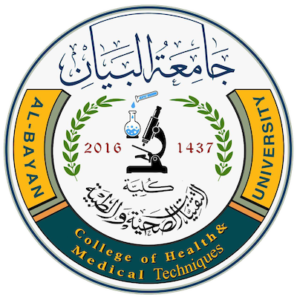The medical laboratory technique department is symbolized by the code (0201).
The department’s courses include the basic areas of medical laboratories biochemistry (basic and clinical biochemistry), hematology (diseases and blood transfusion), histology and anatomy, medical microbiology and immunology, human biology, human physiology and genetics, and medical parasitology, as well as complementary courses such as computer science, devices and laboratory safety.
The third year includes a training curriculum in medical laboratories and hospitals, and the fourth year includes in addition to hospital and laboratory training, presenting research projects.
The Vision:
An innovative society through a scientific, medical and technical institution, applied medical research leadership, and sustainable education on solid scientific foundations
The message:
Choosing the best modern educational systems in preparing technician staff that meet the needs of society through advanced educational programs that keep pace with modern scientific developments and providing graduates with practical and applied experiences to contribute to sustainable development.
The Objectives:
1- Qualifying students as specialized technician staff to serve various medical specialties.
2- Contributing to the development of society by encouraging medical and health research in the fields of medical laboratory techniques.
3- Emphasis on the field of digital transformation and the application of technology in modernizing medical laboratory techniques curricula to serve sustainable development.
4- Solving community problems in a manner consistent with developing health services through the contribution of medical staff specialized in laboratory techniques and providing the necessary equipment to improve the quality of health services.
Description of graduate
A qualified graduate who has completed his academic studies in medical laboratory techniques, and possesses detailed specialized information in his/her studies that enables them to work in medical and health jobs or centers.
Graduate will be able to:
- Perform the laboratory work to isolate germs from clinical samples, stain them and examine them.
- Conducting blood analyzes and tests.
- Conducting clinical chemical examinations.
- Conducting tests of urine, feces, and various body fluids ( synovial fluid, cerebrospinal fluid, and semen).
- Preparing pathological histological slides of body organs and preparing them for microscopic examination.
- Preparing laboratory solutions.
- Operating and maintaining laboratory equipment used in pathological analysis laboratories .

















